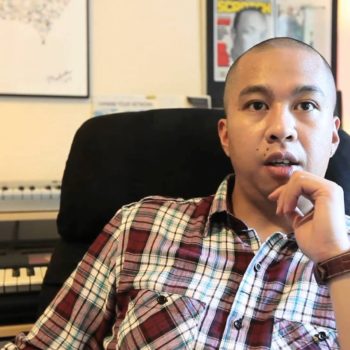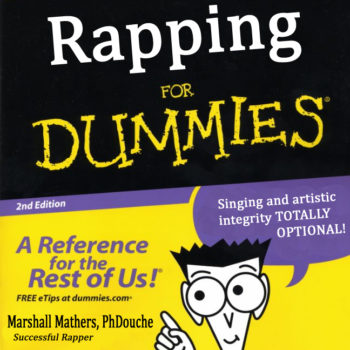Photo Credit: Alison Luntz
Promoting your music is arguably the most difficult part of establishing yourself as an artist, aside from making the music itself.One avenue I don’t find many underground hip-hop artists taking advantage of to promote themselves and their music is busking, a.k.a. street performing, or even going the DIY route and setting up your own show at an underground venue.
I’ve known artists and promoters who have done this and have had varying success, so I reached out to Ben and Matt, who are musicians that have done street performances on a regular basis, as well as Riley, an underground show promoter, to get some insight into what it’s like to promote your music face-to-face on the streets.
Contents
What is busking/street performing?
Busking, also known as street performing, is when an artist or musician plays music and/or performs for donations on the streets or in subways.
I’m sure you’ve seen the brass instrument player in the city playing a tune with his instrument case laid out with some coins and bills scattered about inside. Or perhaps you’ve seen a keyboardist playing for passersby in a subway station. These are buskers.
How much money can you make busking/street performing?
Out of all the variables that go into a street performance, the money earned from donations has to be the most volatile.
Both Ben and Matt are based out of New York City, so their experience most likely differs from those in other cities.
For Ben, he’s able to make up to $30-$50 an hour on a good day, while he usually makes around $10-$20 an hour on a bad day.
Matt offers an even more glaring perspective of how random his earnings can be from busking. Performing during rush hour in Times Square made Matt $50 in ten minutes, while playing for around three hours elsewhere only got him $20.
Take these numbers with a grain of salt because, as both Ben and Matt attested, it really all depends. You’re experience may be different depending on where you are, when you’re playing, how long you’re playing, what you’re playing, and the people for whom you’re playing.
Therefore, it’s best to try different spots at different times playing different things to see what works best for you and your audience.
Underground shows cost money to set up, therefore it’s harder to make a profit
Riley noted how he needs to spend money for renting a venue and how he may have to spend more if he needs equipment and other supplies, as well.
Recently, Riley put on a show called HBC Presents: Astro 8000 in Philadelphia, charging $5 for entry and $1 for drinks. Riley has also brought HBC merch to sell, but even with all of these revenue streams, Riley admits he has yet to make a profit at any of his shows.
“Most of my team’s efforts have been to make the show as enjoyable and affordable as possible. Our main concern has been making sure we can draw a crowd.”
– Riley
This is an important point because, without your audience, you don’t have any chance of making money off a performance to begin with, so it’s crucial that you take care of your fans and create an experience that guests will want to come to over and over again (and hopefully spread the word and bring friends to future shows).
Pros and cons of busking/street performing
With everything, there are upsides and downsides to playing music and performing on the streets. The potential for theft of equipment, instruments, and money from the tip jar is possible; without a permit, you risk the police showing up and removing you from the premises; you may not make a lot of money even after putting in several hours of performing. As you can imagine, there are major considerations to think about before busking.
Do I need a permit to busk?
NYC in particular makes it difficult to get a permit to perform on the streets, so most artists end up performing illegally.
This usually isn’t a problem until police come around. Matt has been asked to pack up and leave, which he does because, as he says, “it’s easier to move somewhere else than to get arrested and have to deal with that.”
You should really check your local laws to see if you need a permit to busk, but most often, you do.
Besides the illegality of performing without a permit, imagine lugging all of the necessary gear you need to the desired location. That can be a ton of hard work in and of itself, just ask Matt:
“If you thought trying to take the subway with a suitcase was bad, try transporting a full drumset by yourself.”
– Matt
Other equipment besides your instrument you may need is a tip jar (which you should always keep an eye to prevent theft), speaker/amp, microphone, cables, a drum machine or similar hardware, and seating for yourself.
It’s not all bad, though. Matt and Ben attest to the large audience you can capture by performing on the spot. In addition, you never know when you might make a valuable connection. Ben says he’s gotten wedding gigs from meeting and talking to people while busking.
There’s also the money to be earned. If you have a free afternoon, why not practice your craft and try to gain some new fans by taking your music to the streets or the subways? Pro tip: bring physical copies of your music to give out to interested persons.
For underground shows, communication is a BIG deal
Riley mentions communication as one of the biggest obstacles he faces when setting up underground shows.
“You are dealing with so many different people: artists, DJs, vendors, photographers, etc. that if one person is late or not doing their job, it can offset the whole show. The whole time you are also interacting with friends and people who came to see what you put together and they want to have conversations with you, as well. It’s a very hectic environment and time management is essential.”
– Riley
In addition, as mentioned earlier, the costs of setting up an underground show can make it harder to turn a profit. There is also much more equipment needed for an underground show than a street performance.
But with an underground show, the potential seem so much greater than busking alone. There’s more money to be made, more dedicated audience members who can show up, more brand awareness that can be built, and the list goes on.
Setting up your own show usually involves getting other acts besides yourself to perform, too. Thus, you bring in each respective performer’s audience, creating a more fertile environment to grow more fans.
Overall, there’s a more direct connection with the audience at an underground show as opposed to just setting up shop on the streets or in subways.
Promoting a street performance or underground show
For a street performance, there really isn’t any promotion to do. If, however, you have an established fan base, no matter how small, it wouldn’t be a bad idea to post on social media, your blog, and/or your website about your pop-up performance to try and spread the word beforehand.
Asher Roth has been doing this recently with monthly pop-up shows in Philadelphia. A quick Tweet beforehand helps get people to know about your performance/event and come out.
As for underground shows, a lot more promotion needs to go into ensuring enough people come out to make the event worth it and, hopefully, make a profit.
For a successful underground show, flyers need to go out, social media promotion needs to be done, and it’s a good idea to bring in artists or people who will attract a larger audience to maximize your potential reach.
If you think the planning and promotion are too much for you to handle alone, don’t be afraid to ask friends or like-minded individuals to assist you. It’s a lot easier for duties to be split up when setting up an underground show, and making sure everything goes as smoothly as possible will only make the experience that much more positive.
Busking advice from experienced street performers
Busking isn’t easy, nor is setting up your own underground show, but if you want to connect directly with your audience or build up a following in your city or practice in front of others, street performances may be just the thing for you.
Ben and Matt recall memorable experiences busking, such as getting an entire train to dance to a Michael Jackson cover and having another singer joining in the performance to the audience’s delight. If you’re looking for a way to make your music easily accessible, busking is a solid option and can also help separate you from those who are stuck on their computers as purely “Internet artists.”
To close, Ben and Matt offer sage advice to those interested in street performing:
“Talk to other street performers to get inside tips, learn on the job, and keep your eyes/ears peeled.”
– Ben
“Make sure you really know your stuff because once you’re out there playing the music (or whatever you do) that’s really just 1/3rd of what you have to keep track of during your performance.”
– Matt

Ben, former staff writer for The Hip Hop Speakeasy, is a talented saxophonist, member of the band QNA, and show promoter. Follow his band, QNA, on Instagram and like them on Facebook.

Matt, former contributor to The Hip Hop Speakeasy, is a talented trumpet player, band member, experienced busker, and beat maker.

Riley is the manager, publicist, and show promoter for HBC, a collective of Philadelphia-based hip-hop artists. (Follow Riley on Twitter and Instagram).





